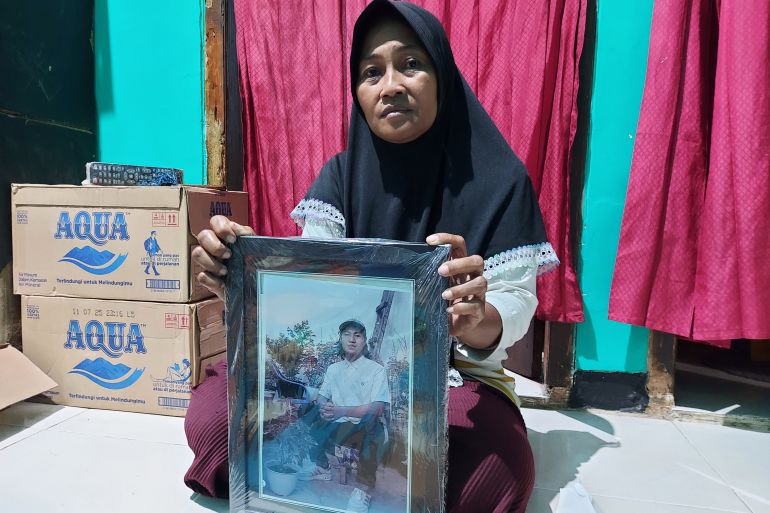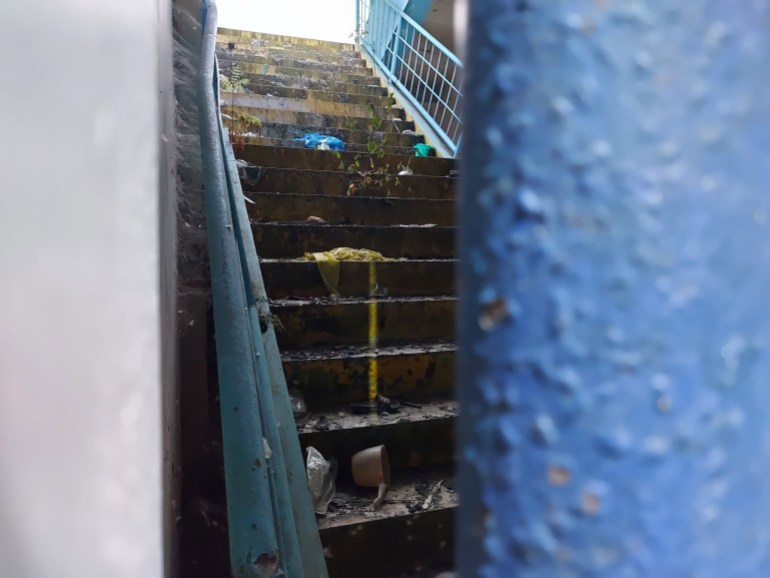Disappointment in Indonesia after football disaster appeal ruling
Indonesia’s top court overturned two police officers’ acquittal over Kanjuruhan stadium crush, but jailed them for only two and 2.5 years.

The families of some of the 135 people who died in Indonesia’s Kanjuruhan Stadium disaster say they are still looking for justice after an appeals court overturned a ruling that freed two police officers charged over the tragedy and jailed them instead.
The officers, Wahyu Setyo Pranoto, the chief of operations of the Malang Regency Police and Bambang Sidik Achmadi, the head of the Prevention Unit of the Malang Regency Police, were cleared of negligence leading to injury or death in March by the Surabaya District Court.
Keep reading
list of 4 itemsStadium disaster justice loses in Indonesia U-20 World Cup furore
‘135 lives. And now, it’s like nothing happened at all’
Indonesian football officials jailed over deadly stadium crush
In a statement on Thursday, Indonesia’s Supreme Court said it had overturned the acquittals, instead sentencing the men to two and a half years and two years in prison respectively.
“I am extremely dissatisfied with the verdict. I wanted them to get the death penalty,” Rini Hanifa, whose son, 20-year-old Agus Rian Syah Pratama Putra, died at Kanjuruhan last October, told Al Jazeera.
“The sentences should have been proportional to what they did to my son. This is justice in Indonesia for those who are in power and have power. Their positions won in the end,” she said of the police officers.
There were 135 deaths after police fired tear gas onto the pitch and into the stands at the end of a match between rival teams Arema FC and Persebaya Surabaya in Malang on October 1 last year in response to a perceived pitch invasion by fans disappointed with Arema FC’s performance.

The tear gas prompted fans to rush for the exits at gates 13 and 14 of the stadium, where many were crushed to death. Some of the families have also said that they suspect that their loved ones suffocated from the gas while still in the stands, a version disputed by the authorities. Hundreds of people were injured.
In announcing the court’s decision in March, Surabaya District Court judge, Abu Achmad Sidqi Amsya, said that Pranoto and Achmadi had not been legally and convincingly proven guilty of giving orders to fire tear gas, although he sentenced another officer, Hasdarmawan, the commander of the Third Mobile Brigade Company of the East Java Police, to one and a half years in prison for his role in the incident.
While handing down his verdict, Amsya claimed that the police had not shot tear gas directly at supporters in the stands, but had only fired it onto the pitch, after which it had been carried by the wind and “never reached the south stands”, something witnesses said, and video footage of the incident showed, was false.
A government-backed investigation from the National Commission on Human Rights (Komnas HAM) found that an estimated 45 rounds of tear gas were fired inside Kanjuruhan Stadium.
“There needs to be legal responsibility,” Komnas HAM chairperson Ahmad Taufan Damanik said at the time.
‘Not in line with what the police did’
The Supreme Court said it disagreed with the acquittal of Pranoto and Achmadi, finding that “[the defendants] have been legally and convincingly proven guilty of committing the crime of negligence causing persons to die, persons to be seriously injured and persons to be injured in such a way that they were temporarily unable to work”.
At the time of the trial in Surabaya, which had been moved from Malang due to the sensitive nature of the case, the prosecution had asked for three years in prison for each police officer.
However, families of the victims reacted with outrage following the ruling of the Supreme Court, Indonesia’s highest court.

Devi Athok Yulfitri, whose two daughters, 13-year-old Naila Debi Anggraini and 16-year-old Natasya Debi Ramadhani, died after watching the match, told Al Jazeera that justice had not been served despite the Supreme Court’s reversal of the acquittals.
“The sentences are not in line with what the police did,” he said. “But at least the Supreme Court judges had some conscience, unlike the judges at the District Court in Surabaya.”
Following the tragedy, questions were raised as to why the police had brought tear gas onto the pitch and then deployed it against supporters, when FIFA, the association that regulates the sport around the world, bans its use in football stadiums.
In addition to the three police officers who have now been sentenced, two civilians, security officer Suko Sutrisno and match organising committee chairman Abdul Haris, were previously sentenced to one year and one and a half years in prison respectively for negligence, which included the failure to carry out a proper risk assessment of the stadium.
With the criminal prosecutions now at an end, some families are pursuing civil action to try and secure financial compensation. There is also the option of a judicial review but only on the grounds that there was something procedurally wrong with the verdict.
Imam Hidayat, a lawyer representing some of the victims, told Al Jazeera that the problem with the lengths of the sentences stemmed from the police officers having been charged with negligence rather than murder.
“From the beginning, we found it difficult to respect the court process in Surabaya because the officers were not charged with premeditated murder,” he said.

“Because of that, we do not really feel as if justice has been done, whatever the sentences. We feel that, according to the jurisprudence, there was enough there for them to be charged with murder.”
Hanifa agreed.
“The families of the victims do not accept the nonsensical verdict of the judges,” she said.